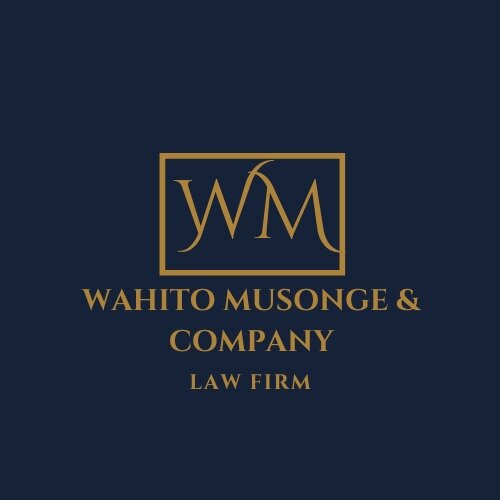Best Toxic Tort Lawyers in Kenya
Share your needs with us, get contacted by law firms.
Free. Takes 2 min.
Or refine your search by selecting a city:
List of the best lawyers in Kenya
About Toxic Tort Law in Kenya
Toxic Tort law in Kenya refers to the legal claims related to exposure to harmful chemical or biological substances. These substances can be present in the environment, consumer products, workplaces, or pharmaceutical drugs. In Kenya, this field is evolving as environmental and health awareness increases, alongside growing industrial activity. The legal framework aims to protect individuals from exposure to harmful substances and provide remedies for those affected, dealing with liability and compensation issues for environmental damage and human health impacts.
Why You May Need a Lawyer
The complexity and technical nature of Toxic Tort cases necessitate seeking legal assistance. Situations where individuals may need a lawyer include:
- Exposure to toxic chemicals in a workplace setting, leading to health issues.
- Health problems due to environmental pollution in residential areas.
- Injuries caused by defective and toxic consumer products.
- Adverse effects from pharmaceutical drugs that were inadequately tested.
- Community-wide exposure to substances due to industrial negligence.
Legal experts can guide you through the necessary legal processes, assist in gathering evidence, and provide representation to pursue compensation or remediation.
Local Laws Overview
In Kenya, several local laws and regulations pertain to Toxic Torts:
- The Environmental Management and Coordination Act (EMCA): This act provides for the sustainable management of the environment and established various bodies, including the National Environment Management Authority (NEMA), to oversee compliance and enforcement.
- The Occupational Safety and Health Act (OSHA): Protects workers from harm related to occupational exposure to hazardous substances.
- The Public Health Act: Regulations under this act empower authorities to control environmental and public health threats.
- The Consumer Protection Act: Contains provisions for ensuring that consumers are not exposed to harmful products.
- The Water Act: Governs the safe and sustainable use of water resources, including the prevention of pollution.
These laws are crucial in addressing Toxic Tort claims by outlining the responsibilities of corporations, industries, and government bodies in preventing toxic exposure and holding them accountable.
Frequently Asked Questions
What is a Toxic Tort claim?
A Toxic Tort claim involves seeking compensation for injuries sustained from exposure to toxic substances. These could arise in several contexts, including environmental pollution, occupational exposure, or defective products.
Who can be held liable in a Toxic Tort case?
Liability can fall on manufacturers, employers, landlords, pharmaceuticals, or governments depending on the source of exposure and regulatory obligations. Responsible parties may need to provide restitution for health damages and losses.
What are common symptoms indicating toxic exposure?
Common symptoms include respiratory issues, skin rashes, headaches, neurological problems, and chronic illnesses. Medical evaluation is crucial for accurate diagnosis linked to toxic exposure.
How can evidence be gathered for a Toxic Tort case?
Gathering evidence requires clinical reports, environmental assessments, witness statements, expert testimonies, and documentation of exposure timelines. An experienced lawyer can offer valuable assistance in assembling these elements.
How long does a Toxic Tort lawsuit Last?
The duration varies substantially depending on the case complexity, the number of plaintiffs, and the willingness of both parties to reach a settlement. Cases can take months or even years to conclude.
Can multiple people join a single lawsuit?
Yes, in cases where individuals are affected similarly by the same source, a class action lawsuit or a mass tort can be filed. This process consolidates resources and simplifies legal proceedings.
What compensation is available in a Toxic Tort claim?
Compensation includes medical expenses, lost wages, pain and suffering, and in some cases, punitive damages meant to deter future negligent actions by parties responsible.
Do all exposed individuals qualify for a claim?
Not necessarily. An individual must demonstrate sufficient exposure to the toxic substance directly linked to a resultant health issue to qualify for a claim. Legal guidance can clarify eligibility.
How do statutes of limitations affect these cases?
The statute of limitations imposes a deadline for filing claims, which typically starts when the injury is discovered. In Kenya, seeking legal advice swiftly is vital to ensure claims are filed in time.
Is scientific evidence required in these cases?
Yes, scientific evidence is often pivotal to establish causation between the toxic exposure and the alleged injuries. This may require expert testimonies and laboratory test results.
Additional Resources
Several resources can aid those seeking advice or assistance in Toxic Tort matters:
- National Environment Management Authority (NEMA): Offers guidance and support related to environmental regulations.
- Kenya Medical Research Institute (KEMRI): Provides insights into health impacts related to toxic exposure.
- The Law Society of Kenya: Can help connect individuals with experienced lawyers specializing in Toxic Tort law.
- Consumer Federation of Kenya (COFEK): Advocates for consumer protection against harmful products.
Next Steps
If you believe you have been affected by toxic exposure and require legal assistance, consider the following steps:
- Consult a doctor to obtain a medical evaluation of your symptoms linked to potential toxic exposure.
- Collect all relevant records and documentation pertaining to your exposure and medical condition.
- Seek out a lawyer specializing in Toxic Tort cases through recommendations from professional bodies or organizations like the Law Society of Kenya.
- Discuss your case with the lawyer to evaluate its viability and to understand the potential compensation you could claim.
- Follow the legal advice and steps outlined by your lawyer to commence your claim process, if applicable.
Lawzana helps you find the best lawyers and law firms in Kenya through a curated and pre-screened list of qualified legal professionals. Our platform offers rankings and detailed profiles of attorneys and law firms, allowing you to compare based on practice areas, including Toxic Tort, experience, and client feedback.
Each profile includes a description of the firm's areas of practice, client reviews, team members and partners, year of establishment, spoken languages, office locations, contact information, social media presence, and any published articles or resources. Most firms on our platform speak English and are experienced in both local and international legal matters.
Get a quote from top-rated law firms in Kenya — quickly, securely, and without unnecessary hassle.
Disclaimer:
The information provided on this page is for general informational purposes only and does not constitute legal advice. While we strive to ensure the accuracy and relevance of the content, legal information may change over time, and interpretations of the law can vary. You should always consult with a qualified legal professional for advice specific to your situation.
We disclaim all liability for actions taken or not taken based on the content of this page. If you believe any information is incorrect or outdated, please contact us, and we will review and update it where appropriate.
Browse toxic tort law firms by city in Kenya
Refine your search by selecting a city.











